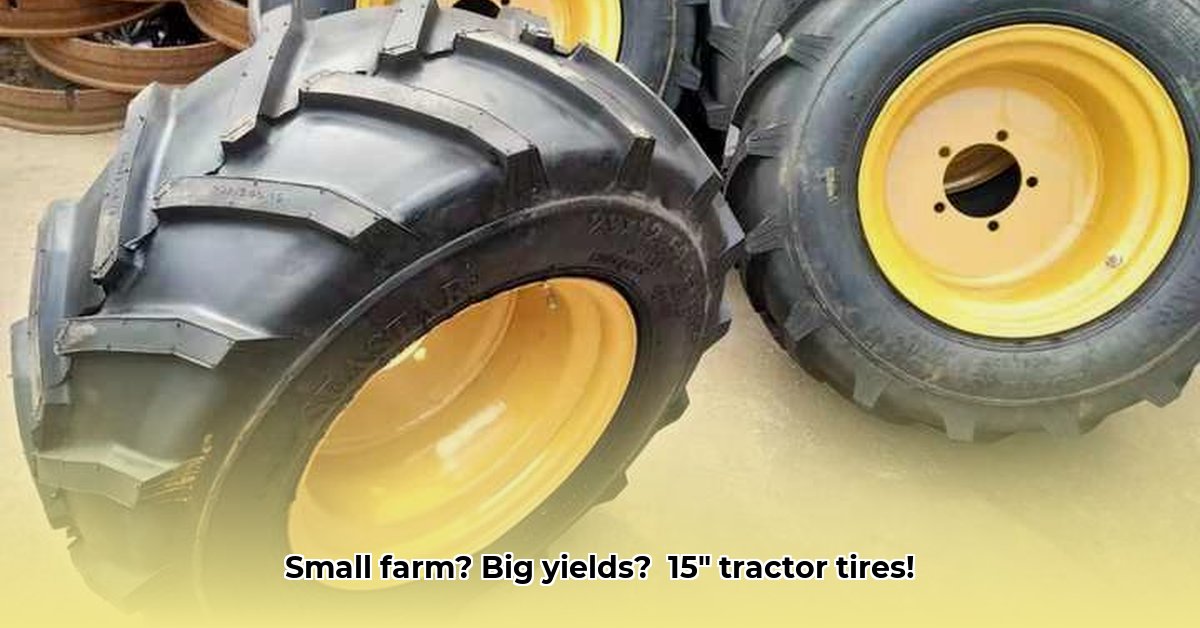
Running a small farm is a balancing act: efficiency, cost, and environmental responsibility all need careful consideration. Even seemingly minor decisions, like choosing the right tractor tires, can significantly impact all three. For more information on larger tire sizes, check out this resource on larger tractor tires. This guide focuses on 15-inch tractor tires, exploring how the right choices can boost your yields, protect your soil, and even save you money.
15in Tractor Tires: Small Size, Big Impact
For small-scale farmers, every resource counts. Let's examine how wisely selecting 15-inch tractor tires can significantly enhance your farm's sustainability and profitability.
Soil Health: The Foundation of Success
Healthy soil is vital. Imagine trying to bake a cake with a lumpy, hard batter—the result wouldn't be good! Similarly, compacted soil hinders root growth and nutrient uptake. Heavy machinery can compact soil, limiting water absorption and reducing yields. Smaller tractors, however, equipped with properly inflated 15-inch tires, lessen this impact by distributing weight more evenly, preventing excessive soil compression.
Fuel Efficiency: Savings and Sustainability
Fuel is a major operating expense. Under-inflated tires increase fuel consumption, impacting your budget and the environment. 15-inch tires with optimized tread patterns reduce rolling resistance, meaning your tractor uses less fuel to accomplish the same task. This translates directly into cost savings and decreased greenhouse gas emissions.
Tire Lifespan: A Long-Term Investment
A tire’s initial cost doesn't tell the whole story. Longer-lasting tires save money in the long run and reduce waste. While some might assume smaller tires wear out faster, properly maintained 15-inch tires can be very durable, leading to less downtime and fewer replacements.
Choosing the Right 15in Tractor Tires: A Practical Guide
Selecting the right tires is crucial. Follow this step-by-step guide:
Assess Your Soil: Sandy soils need aggressive treads for grip; clay soils benefit from wider tires for even weight distribution.
Define Your Tasks: Tilling, planting, or hauling goods require different tread types. A tire suitable for mud might not be ideal for hard-packed ground.
Check Load Capacity: Ensure your tires can handle your tractor's weight and any attached equipment. Overloading is dangerous and causes premature wear.
Analyze Tread Patterns: Different patterns offer optimal traction in various conditions. Prioritize fuel efficiency or wet-condition grip based on your needs.
Consult the Experts: Agricultural tire suppliers possess valuable insights based on your specific farm type and soil conditions.
Sustainable Farming with Smart Tire Choices
Sustainable agriculture minimizes environmental impact. Selecting appropriate 15-inch tires is key:
- Reduced soil compaction improves soil health and reduces the need for fertilizers.
- Lower fuel consumption directly translates to smaller carbon emissions.
- Longer tire lifespans decrease waste sent to landfills.
Weighing the Pros and Cons
Decisions require balanced consideration:
| Pros | Cons |
|---|---|
| Reduced Soil Compaction | Limited options compared to larger sizes |
| Improved Fuel Economy | May not suit all tractors and tasks |
| Potentially Lower Initial Cost | Possibly shorter lifespan under heavy use |
| Ideal for smaller tractors and implements | Reduced load-carrying capacity |
The optimal choice depends on your farm's specific needs and operations.
Ongoing Research and Future Trends
Agricultural tire technology is constantly evolving. Research focuses on new materials and designs to improve soil conservation and fuel efficiency. Stay informed about new developments to make the most sustainable choices.
Choosing the right 15-inch tractor tires is more than just buying rubber; it's an investment in your farm’s long-term health and profitability. Make an informed decision, and watch your yields and sustainability soar.